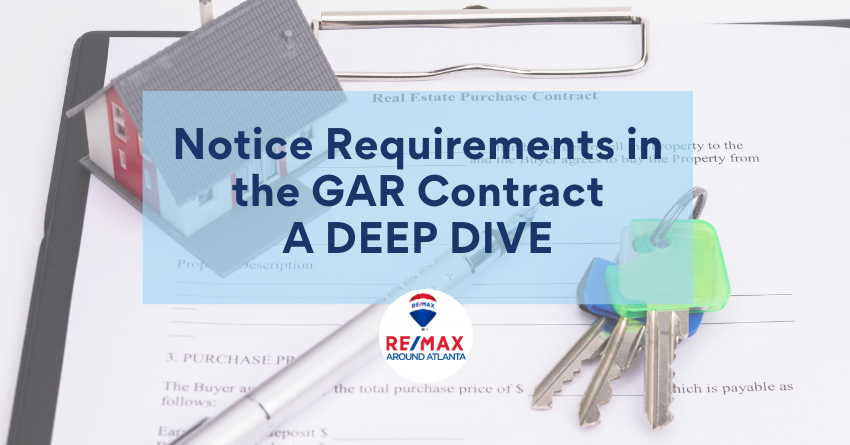|
One of the review points of every brokerage agreement is whether contact information for the client and the licensee is included in the signature block of the brokerage and purchase agreements. Legal notices to parties are driven by that content. If an email, a fax or a physical address is not included, that form of notice cannot be used. Without good contact information, you may find yourself personally delivering documents to a party – either close by or far, far away. Read on. Rules for Properly Delivering Notice.
When Is Notice Received? It depends. Under the GAR Contract, notice is considered “delivered and received,” and therefore effective, at varying times depending on the method with which such notice was sent. 1. Notice via e-mail.Notice sent by electronic mail (email) is effective at the time it is sent. Put simply, the very act of sending notice electronically is the legal equivalent of “delivery and receipt,” provided that the notice is sent to an address properly identified in the contract or that was subsequently provided following another permissible method of notice. However, even with this rule in place, it is wise to ensure that the email or fax actually went out and the other party actually received it—an email left sitting in an “outbox” has not been “sent” for notice purposes. It is good practice for email notices to be sent “read receipt requested” to make proving actual receipt easier should a dispute arise. 2. In-person deliveryFor in-person delivery, notice becomes effective at the time it is actually received by the party for whom the notice was intended (either the party or the party’s authorized agent). While the GAR Contracts permit notices to be delivered in person, there is no requirement that the person to whom the notice is given be present to receive the notice. Because proof of delivery can become an issue, if the addressee is not expected to be available, the party giving the notice should have another person present (a witness) who can attest to the delivery of the notice. In all events, the party delivering the notice should create a record of the time, date, and manner of the delivery of the notice. 3. Via Delivery ServiceNotice sent by delivery service (overnight delivery or certified/registered U.S. mail) is considered delivered at the time when it is delivered to an address provided in the contract. This is in contrast to in-person delivery (where notice is only effective upon actual receipt). For example, imagine that the buyer sent a unilateral notice of termination to the seller’s home address (provided in the contract) that was delivered. Even if the seller was away on vacation and did not actually receive or read the notice until weeks later (or even at all), the notice would still be considered “delivered and received” on the date it was delivered. 4.Fax Transmission Notice sent via a facsimile number or email address provided in the contract is deemed to have been given as of the date and time it is transmitted. A fax transmission confirmation should be kept in the file. If fax confirmation is not produced by the fax machine or is produced incorrectly, the fax can be hard to prove. In such cases, the fax notice would not be presumed to have been received when transmitted, but it can still constitute good notice if the sender can otherwise prove that it was received. Remember, a fax number must be in the signature block of the contract for a fax notice to be valid. Many agents work from their home offices and only infrequently go to the broker’s office. For this reason, the GAR Forms Committee has permitted an agent to list a home office facsimile (or any other number they wish). However, this can be particularly dangerous to the agent away from home, due to notices by fax often being deemed received at the time they are sent.
0 Comments
Leave a Reply. |
RMAAReal Estate News, Brokers Blog & More Categories
All
Archives
July 2024
|


 RSS Feed
RSS Feed